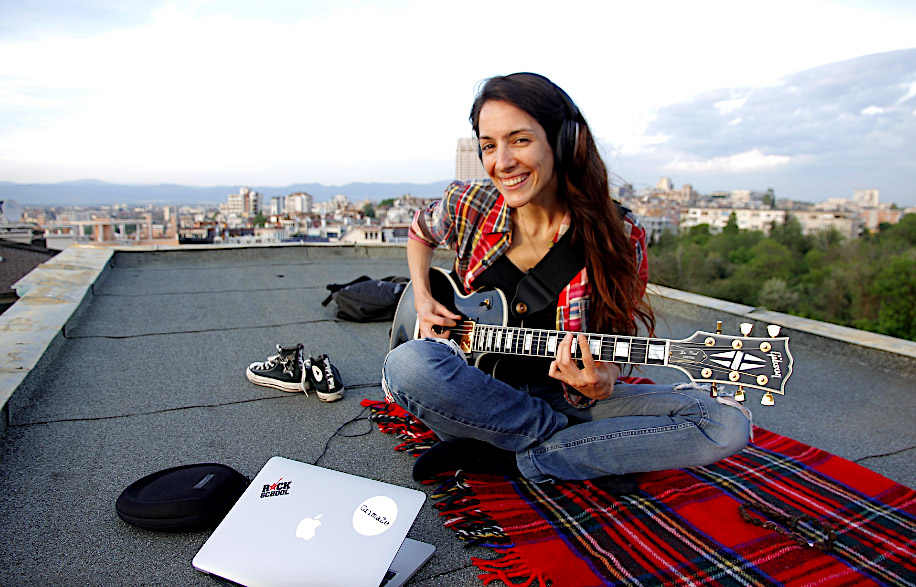 I would have discovered Drooble sooner or later, via social media or word-of-mouth from musician friends. I had to; Drooble was exactly the kind of thing we all needed—a free means of collaborating musically with anyone, anywhere, at any time.
I would have discovered Drooble sooner or later, via social media or word-of-mouth from musician friends. I had to; Drooble was exactly the kind of thing we all needed—a free means of collaborating musically with anyone, anywhere, at any time.
After writing a song and doing a bare-bones recording of it I can post it on the Drooble site and invite other musicians to respond and maybe send me a track or two to enhance my recording. If I’m having a problem with my software or instrument I can post my question and get feedback right away. I can even hook up with musicians here in Montreal for in-person jam sessions.
So, what’s a “Drooble?”
Drooble is a social networking platform connecting musicians all over the world.
“Drooble is about connecting musicians so that they can help each other. It’s not a self-promotion electronic graveyard,” saith the website. Drooble openly discourages people from using it just to promote their work. They really want people to use the platform to help each other, frequently and continually. Competition is frowned on in favour of mutual encouragement and support.
While the web keeps cranking out start-ups that essentially compete with Soundcloud, Drooble gives us the dials to turn up the love volume. On the Drooble site you can find musicians, singers, producers, sound engineers, lyricists, and just about any resource for developing your musical projects. Drooble also offers free apps for metronome, tuning, and basic sound engineering.
Creating music and recording it on your laptop, gratifying though it may be, is lonely work. If you’re lucky enough to be in a band you already have some sense of connection with other artists, but you still may have to wait indefinitely to get your music in front of listeners. So there’s nothing like putting a song on Drooble and right away getting likes and positive comments, happily watching your little homemade recording slowly rise on Drooble’s charts. It’s like a test drive that can let you know if a certain song is worth developing or not.
Beginning with Melina
So what brainstorm lead to such a groovy platform? Before Drooble blossomed into social media it was budding in the mind of one Melina Krumova, in Sofia, Bulgaria. Krumova is a guitarist in the metal band Grimaze and also a spiritually-minded nature lover who meditates, practices yoga, and climbs mountains.
As Krumova recently explained to me, “It all began with the inner transformation that music initiated for me. I started playing the guitar and realized how gradually I was becoming much more self-aware, more honest in my expression, more connected to others, and much more present in life. So naturally I wanted to share this possibility for growth through music with more people.
“I founded a music school in my home town which quickly expanded to many other areas like recording studios, rehearsal spaces, concert venues, promotion, events, etc. What’s most important is that this place became the creative home of a friendly community of several thousand people, united by the love for music.
“I said, ‘if I can do it locally, then I should be able to do it globally.’”
Creating positive change
The website proclaims, “At Drooble, we believe that music has the power to change the world for good.”
“I know for sure,” says Melina, “that playing music helped me change my inner world for good. It took me deep within, where I learned a lot about myself. I consider ‘changing for good’ to be a process of acquiring awareness and clarity. And music does it; it digs, taking emotions out so we can understand them better.
“On a more superficial level playing music develops so many positive qualities within a person: will, discipline, confidence, independence, a stronger memory, cognitive processes … The list is endless. Even for those people who are just listeners music does a lot: It brings consolation, healing, inspiration, freer emotional expression, creativity, and many other good things.
“I reckoned that if this worked for me, it would for sure work for at least several million others.”
How it works
Developing an online platform proved to be a series of trials and errors. In the end the Drooble team settled on what they called their “Karma Economy,” in which musicians earn Karma “points” every time they like or comment on each other’s songs or help another musician in some way. The accumulated Karma can then be spent on Drooble’s promotional tools, like airtime on Drooble Radio, presskits, and blog interviews.
Drooble is radically different from most music promotion websites, where even excellent posted music might get no response at all, even when money is paid to the site for the privilege of posting music there. Drooble removes the sense of isolation and the feeling of being unheard, and being heard, as I’ve experienced, is one of the best ways to stay motivated.
Krumova has long been against social media and promotional sites that treat users as little more than commodities, and she has succeeded in harnessing the internet’s capacity to create mutually helpful communities. She doesn’t underestimate the value of sites like Soundcloud, Bandcamp, Youtube, and Jamendo, but realises that simply putting your music out there isn’t enough: It needs both a hearing and a response.
“We’ve identified that more than anything musicians want their music to be heard, so it all goes down to promotion. On Drooble musicians can get much more feedback and purchase much more effective promo tools using the Karma currency earned through their support from others instead of money.”
What about the cost of rent?
All this isn’t to say that Drooble blindly dismisses the legitimate need for cold, hard cash.
“Our next step,” says Krumova, “is to enable musicians to earn some real money through their music-related skills, so expect a new cool feature in the next month.”
Good news, that. For my part Drooble has connected me with a producer in Minnesota, a couple of jazz musicians in France, American singers, Canadian songwriters, and spoken word creators from all over, and a number of collaborations are on the go. All four of the songs I’ve so far posted have been voted to the top of Drooble’s charts in jazz, blues, and soul. Having so many irons in the fire is exciting, but the most wonderful part is knowing that there are people out there listening to and enjoying my music.
One more big plus: Most of the music posted on Drooble is amazingly good — inspired, well-crafted, moving, and meaningful. As a music writer I get a lot of press releases promoting the latest rising star and asking for reviews and interviews; the broad majority get a pass from me regardless of how many accolades they’ve won in the music industry.
Turning on Drooble Radio on the other hand instantly delivers listening experiences that thrill me to the boot heels. It’s just one more proof that music is evolving away from the starmaker machinery and in the direction of real creativity and inspiration.
It feels good just to think about that for a minute.


